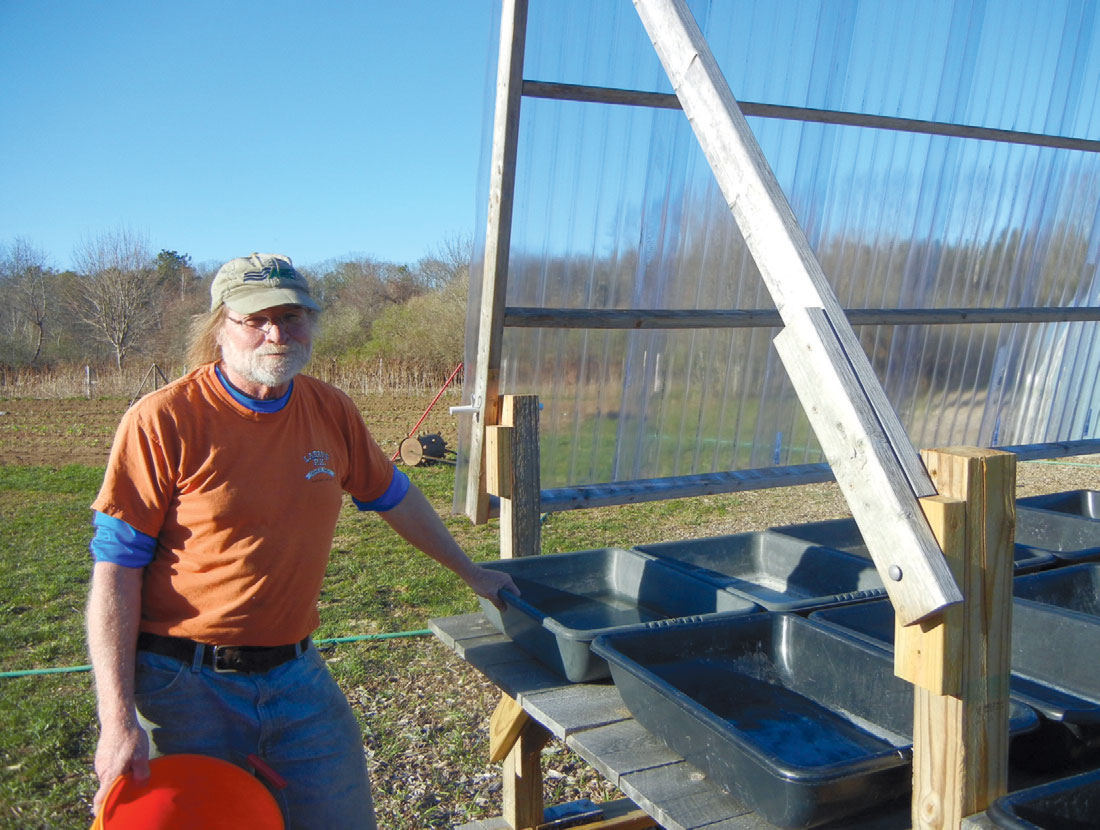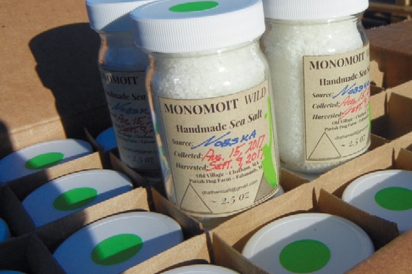Monomoit Wild Salts and Sugars
What do sea salt and maple syrup have in common? Chris Weidman of Monomoit Wild Salts and Sugars, that’s what! In 2013, Weidman, a former commercial fisherman and oceanographer, started refining salt from the sea in the saltworks he crafted in the backyard of the Chatham house that had been in his family for generations. He named his company Monomoit, the name for Chatham given by its original inhabitants. The current saltworks are at Pariah Dog Farm in Falmouth.
For ten years, as Weidman made maple syrup at his daughter’s 60-acre farm in Germantown, New York, he contemplated the similarities between maple sap (2% sugar) and seawater (3% salt). “It’s the same problem,” he realized. “You have to get rid of fifty times the water to get the product.” In 2013, he was spending time caring for his mother in the Chatham home and decided to build his saltworks to help fill the time and entertain his mother. Both motives were exceptionally fruitful!
Weidman harvests seawater from the shoreline in Chatham and Falmouth and, more recently, Barnstable Harbor—specific spots, different times—so that the various “lots”, while similar, have distinctive flavors, textures and trace ingredients. Because the source location and the weather on a given seawater collection day affects the end product, each bottle of sea salt is marked with the water source, and the days of both collection and harvest to celebrate its singularity. Weidman alternately uses “brings to salt”, “comes to salt” and “goes to salt” as he describes the process. When I pointed that out, he just chuckled.
In the warmer months, May through October, evaporation is done the traditional way using just the sun and wind and a corrugated plastic cover in case of rain, that Weidman calls “summer salt”. Evaporation occurs at around one quarter inch per day and it takes two weeks in the summer to make a batch from start to finish, if the weather cooperates. Sea salt is 85% sodium chloride, with the remainder comprised of numerous trace salts such as magnesium sulfate and calcium carbonate. In the spring, winds may drop pine pollen in the saltwater and in summer, some corn silk, or whatever else is growing on the farm, adding uniqueness to each batch.
In the colder months, December through March, when solar evaporation rates are low, he allows the seawater to freeze in the buckets. “As seawater freezes, the dissolved salt is separated from the ice and then pushed back into the remaining seawater, making it saltier,” Weidman explains. He removes the ice periodically and calls the remaining salt “winter salt”.
These winter buckets of highly concentrated salt water—approximately 18%—are the beginning of the next season’s salt production that get poured into black tubs. Weidman makes a map of the black tubs as to the collection date and place so the salt labels can reflect this. When he filters and puts out this highly concentrated solution in June, it can be salt by the end of the day if there is enough wind and sun to achieve the final quarter-inch evaporation rate needed. The crystal size is affected by the real time (hours, minutes) that the crystallization process takes on the actual day—the last quarter-inch day—that the mixture “comes to” or “goes to” salt.
In response to my enquiry about how much salt, or how many bottles, he processes in a year, Weidman, a former fisherman, replied, “that would be like asking a fisherman how much fish he caught!” No further clarification needed.
The math:
Winter seawater: 24 buckets ends up as four by the spring
Seawater is 3% salt, so 24 buckets @ 3% = 4 buckets @ 18% (the concentration increases by 6 times: 6 x 3% = 18%)
5 gallons of water = 1 pint of salt
Where to find it:
The original honor station at the corner of Hallett Lane and School Street in Chatham’s Old Village neighborhood—just down the road from Chatham Lighthouse Beach.
For other locations on the Cape, visit monomoitwild.com






